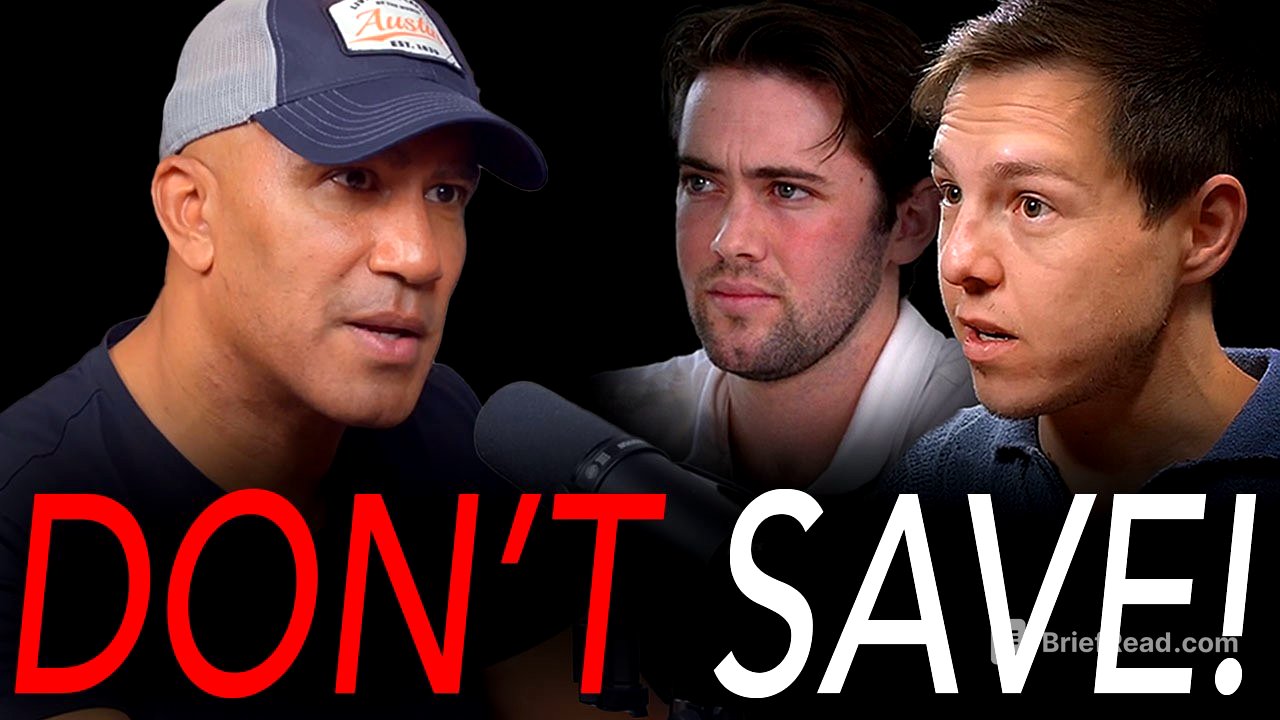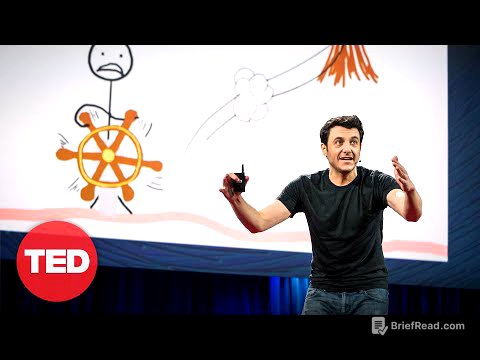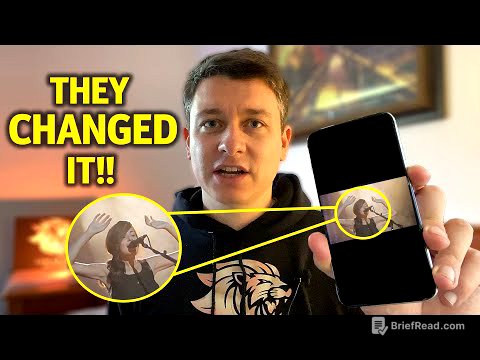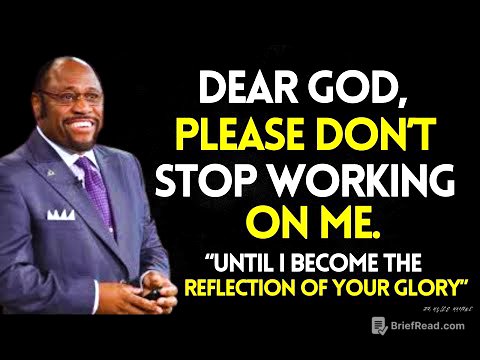TLDR;
This episode of The Iced Coffee Hour features Bill Perkins, a commodities trader and author of "Die with Zero," who shares his unique philosophy on spending money for fulfillment rather than solely focusing on saving. He challenges the conventional wisdom of delayed gratification, advocating for enjoying life experiences while young and healthy. Perkins emphasizes the importance of aligning spending with personal values and biological age, and not being driven by fear.
- Prioritize fulfillment over endless saving.
- Align spending with personal values and biological age.
- Recognize the declining utility of money as health declines.
- Embrace calculated risk-taking for a more fulfilling life.
- Be intentional about choices to maximize happiness.
Intro [0:00]
The episode introduces Bill Perkins, who challenges the conventional focus on saving for retirement. Perkins advocates for prioritizing fulfillment and thriving by spending money on experiences and passions while young and healthy, rather than delaying gratification indefinitely. He argues that fear-based saving can rob individuals of their current life and that the body's inevitable decay limits future enjoyment.
When life really begins [1:05]
Perkins explains that many people don't take life seriously until they realize its finite nature. Recognizing the limited time on Earth encourages individuals to pursue their true desires and stop caring about others' opinions. He contrasts this with the fear-based mindset of excessive saving, which prevents people from thriving during their prime years when they have the health and ability to enjoy life.
How he got rich [3:07]
Perkins shares his journey to wealth, starting as a commodities broker and later becoming a successful natural gas trader. He emphasizes the importance of being unafraid of risk and having a stoic attitude to handle losses and stress. Perkins equates money to time, explaining his desire to exchange a few hours of his time for many hours of others' time. His initial goals were driven by a desire for freedom and a rockstar lifestyle, wanting to exceed his wants without being frugal.
Why he succeeded [4:45]
Perkins attributes his success to curiosity and stoicism, which allows him to handle losses and think clearly under pressure. He explains that stoicism, cultivated through reading and detaching from ego, is crucial in all aspects of life, including relationships. He emphasizes the importance of dedication and continuous learning, similar to how the hosts of The Iced Coffee Hour constantly improve their content.
Lessons from books [8:16]
Perkins shares that reading books and actively implementing the lessons learned is crucial for personal growth. He emphasizes that acquiring new behaviors and mindsets takes time and practice, similar to learning to play the piano. He also mentions "The Four Agreements" as a key book for trading and life, highlighting the importance of not taking things personally.
Is his net worth accurate? [9:13]
Perkins addresses Google's net worth estimates, stating they are not entirely accurate and can be influenced. He confirms that his net worth has been north of $100 million but fluctuates with market conditions. Perkins discusses his philosophy of intentionally declining net worth as he ages, emphasizing that the peak should align with biological age and the ability to enjoy experiences.
Life expectancy [12:33]
Perkins estimates his life expectancy to be between 76 and 84 years, emphasizing that biological age, rather than numerical age, should guide financial decisions. He dismisses the idea that modern medicine will guarantee everyone lives past 100, highlighting that individual choices and compliance with health recommendations greatly influence longevity.
Feeling vs. being rich [13:14]
Perkins shares that he felt rich even before becoming rich, particularly when he started earning more than his mother. He describes the feeling of upward trajectory and discretionary income as ecstatic. Despite later achieving millionaire status, he emphasizes that the initial feeling of financial progress was more impactful. He admits to initially spending his wealth on advertised lifestyles but later shifted his perspective.
Why natural gas? [15:06]
Perkins explains his decision to trade natural gas, noting that he serendipitously joined the New York Mercantile Exchange when natural gas contracts were just starting. He recognized the potential of this growing, efficient fuel compared to legacy commodities like crude oil. This strategic choice allowed him to make significant profits.
Sponsor - OpusClip [18:09]
The hosts briefly promote OpusClip, an AI-powered video editor that helps creators clip and repurpose long-form content for short-form platforms.
Saving vs. spending joy [23:02]
Perkins addresses the idea that some people find more fulfillment in saving than spending, stating that while there's some value in knowing you're doing the right thing, the purpose of delayed gratification indefinitely is no gratification. He emphasizes that the body decays, limiting future enjoyment, and that the reward of working is the experiences money affords, not the money itself. He uses the analogy of collecting hammers and saws without ever building anything to describe saving without a purpose.
Drawing the line on spending [26:25]
Perkins acknowledges that calculating opportunity costs can be tough, but it's important to have a mental model. He suggests considering the trade-off between experiences now versus later, factoring in physical fitness, social dynamics, and potential health declines. He encourages thinking through these decisions rather than blindly saving.
Fear of death [28:07]
Perkins shares that contemplating death helps cut through ego and prioritize living a fulfilling life. He suggests living each day with death in mind, influencing current decisions about saving, risk-taking, and activities. Knowing one's health and potential lifespan encourages living and converting wealth into experiences.
Does money bring happiness? [30:36]
Perkins believes money does buy happiness if used correctly, comparing it to Chuck-E-Cheese tokens that must be exchanged for the desired prize. He argues that money is a tool, and those who fail to find happiness with it simply don't know how to use it. He suggests that the point of diminishing returns is person-specific, equating to "money for all the things you want plus a little bit more".
Best ROI purchases [37:10]
Perkins identifies experiences shared with friends as the highest ROI for spending. He emphasizes that humans are wired to connect, and activities like games, hikes, and tours create lasting memories and strengthen bonds. He also highlights the value of boats, particularly wake surf boats, for creating core memories and shared experiences.
Sponsor - Notion [37:14]
The hosts promote Notion, an all-in-one workspace powered by AI, which they use for guest planning, sponsor tracking, and schedule organization.
Spending $ on happiness [40:40]
Perkins shares that his wake surf boat has been the highest ROI purchase because it allows him to share fun experiences with many people. He emphasizes the importance of memory dividends and radioactive connections. He also values simple, cost-free activities like hiking with friends.
Money optimization blueprint [43:01]
Perkins outlines a five-step blueprint for optimizing money for fulfillment: determine your expected date of death, break your life into periods, write down the type of life you want in each period, allow for discovery and update your plans, and focus on what you want out of life before considering money. He stresses that knowing what you want allows for better allocation of resources and helps overcome the fear of spending.
Writing the book [47:49]
Perkins shares that writing "Die with Zero" took about 18 months, involving extensive revisions and feedback. He wanted the book to "save lives" by teaching people to optimize their lives for fulfillment rather than wasting them. He explains that his number one fear is wasting his life.
Breaking his own rules [49:32]
Perkins admits that he often breaks the rules of his own book because autopilot is a default mode for humans. He explains that routines help people survive, but they don't help them thrive. He relies on reminders from his wife and his own writing to get off autopilot and make decisions that lead to a more fulfilling life.
Advice for low earners [50:58]
Perkins advises people with low incomes to prioritize their health, as it is the biggest determinant of fulfillment. He emphasizes that healthy choices can be made with little or no money. He encourages thinking about what choices will be more fulfilling, regardless of income level, and emphasizes that his book is about living, not just for the rich.
Trying new things [52:26]
Perkins frequently tries new experiences to discover what he enjoys. He shares his positive experience riding the Orient Express, which led him to discover a whole world of train travel. He emphasizes the importance of being in "find out mode" and realizing that there's a world of things he doesn't know he likes.
Biggest waste of money [53:13]
Perkins identifies cars, particularly luxury cars like Lamborghinis and McLarens, as his biggest waste of money. He realized he was buying them based on advertised lifestyles rather than his own preferences. He felt awkward and didn't enjoy driving them. Now, he primarily uses Uber and owns a Toyota Sequoia.
Worst financial mistakes [54:53]
Perkins shares his biggest financial failures, including a large infrastructure project in El Salvador and California that was ultimately rigged and unsuccessful. He also lost a significant amount of money in movie financing.
Movie investing regrets [56:04]
Perkins explains that his movie investments were not financially motivated but were passion projects. He acknowledges that most independent movies don't make money and that the primary beneficiaries are the actors and union workers. He expected a negative ROI of 33% on his movie investments.
Maximize your 20s [59:59]
Perkins advises those in their 20s to prioritize experiences with friends, as those relationships may change over time. He suggests creating moments and excuses to spend time together. He also recommends balancing physical activities with sedentary ones, shifting more athletic pursuits to younger years to maximize enjoyment.
Spending young with low income [1:03:03]
Perkins advises those in their 20s with low incomes to consider their financial trajectory. If they expect to earn more in the future, they should prioritize experiences, as the return on fulfillment is higher than a Roth IRA. However, if their income is steady or declining, they should prioritize saving for survival.
Sponsor - Shopify [1:04:58]
The hosts promote Shopify as an all-in-one business partner for entrepreneurs, highlighting its design tools, AI features, and marketing capabilities.
Over vs. underspending [1:11:10]
Perkins believes underspending is more dangerous because he fears wasting his life. He argues that the hosts of The Iced Coffee Hour have zero risk because they are intelligent and skilled and can always find employment or start another business. He encourages taking maximum risk and not living in fear.
Intentional spending [1:14:32]
Perkins emphasizes the importance of being intentional about spending resources, including time, money, and mental energy. He reiterates the need to be aware of one's mortality, break life into periods, and plan experiences. He stresses that life is about discovery and that a fulfilling life involves continual exploration.
Best time of life [1:16:36]
Perkins believes the best time of life is always now. He reflects on past periods, such as courting his wife and raising his daughters, with gratitude. He emphasizes that each period has activities that fit that time, and it's important to make the most of each stage.
Raising humble kids [1:17:32]
Perkins discusses balancing his philosophy with raising his daughters, ensuring they don't grow up spoiled but appreciate the work and sacrifice that went into their privileged lives. He aims to give them the values and tools to navigate the world and make their own mistakes. He acknowledges that giving them too much money could stifle their creativity and rob them of the struggle that is a necessary ingredient for success.
Inheritance: yes or no? [1:20:11]
Perkins advocates for giving inheritance to children while they are still young enough to enjoy it, rather than as a bequest after death. He emphasizes the importance of setting a specific amount and protecting it in a trust. He criticizes the idea of simply leaving money to children upon death as random and not deliberate.
Would he change the book? [1:21:57]
Perkins states that he wouldn't change anything about his book, as he believes the principles are axiomatic and based on the full life cycle hypothesis. He explains that the book is about discovering a truth, not inventing a new concept. While some readers want a more detailed cookbook, he believes the value lies in understanding the core concepts.
Where he invests [1:24:32]
Perkins admits that he is not a role model for investing, as he takes maximum risk. Most of his money is tied up in his fund, venture capital, and private placements. He acknowledges that he may have too much money in illiquid assets and is now shifting towards more liquid investments due to his age.
Advice for entrepreneurs [1:27:03]
Perkins advises aspiring entrepreneurs to ensure they are the type of person who can handle the risk and uncertainty. He emphasizes that execution is more important than the idea itself. He encourages taking the riskiest path, which is investing in oneself and starting a business.
What he learned from Bilzerian [1:28:44]
Perkins shares that he learned from Dan Bilzerian that he doesn't want to be too famous. He values anonymity and the ability to travel and experience life without constant attention. He also learned that fame is a powerful sexual attractant but ultimately robs one of a fulfilling life.
Most impactful fan stories [1:32:50]
Perkins shares that he often hears stories from people who have "needle scratched" their lives after reading his book, pursuing their passions and spending more time with family. He finds these stories overwhelming and fulfilling.
Best health ROIs [1:36:11]
Perkins identifies walking and hiking as the best ROI activities for health because they are free, enjoyable with friends, and provide a fulfilling experience while improving fitness. He emphasizes that sitting is death and that free activities are often the most beneficial.
Skincare [1:37:19]
Perkins shares his simple skincare routine, which involves washing his face and using vitamin E oil. He attributes his youthful appearance to good genetics, not smoking, not drinking much, and being a vegetarian.
Why they started podcast [1:38:46]
The hosts discuss why they started The Iced Coffee Hour. Jack wanted to provide a more candid platform for Graham to connect with his audience, while Graham was inspired by Joe Rogan's success.
Favorite travel spot [1:48:07]
Perkins shares that Japan is his favorite place to travel because it's a modern, first-world culture that is completely different from anywhere else. He appreciates its unique way of thinking and the opportunity for discovery. He also enjoys Italy, Maui, Greece, Croatia, Denmark, and Amsterdam.
Places he avoids [1:49:39]
Perkins avoids places where the death rate is extremely high and those designed primarily for tourists. He dislikes cruises because they are canned, scheduled, and involve excessive consumption.
FIRE movement [1:51:47]
Perkins believes the FIRE (Financial Independence, Retire Early) movement is a great skill set, especially in America, where there is an epidemic of careless spending. However, he criticizes the movement for sometimes becoming savings porn and losing sight of the goal of a fulfilling life. He emphasizes that the goal is not the money, but fulfillment.
Panhandling experiment [2:23:17]
Perkins shares his experience panhandling as part of an emotional intelligence class. He found it eye-opening and liberating, realizing that he could make money no matter what. He made enough to be on pace to earn $60,000 to $70,000 per year tax-free. He notes that it was a dangerous job, but it helped him face his fears.









